Mona Chitnis
Private Federated Learning In Real World Application -- A Case Study
Feb 10, 2025

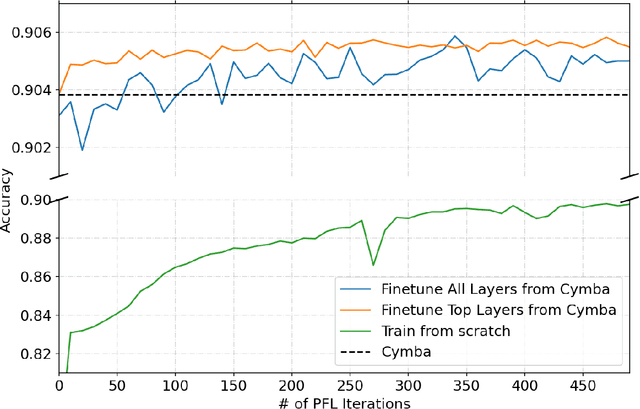
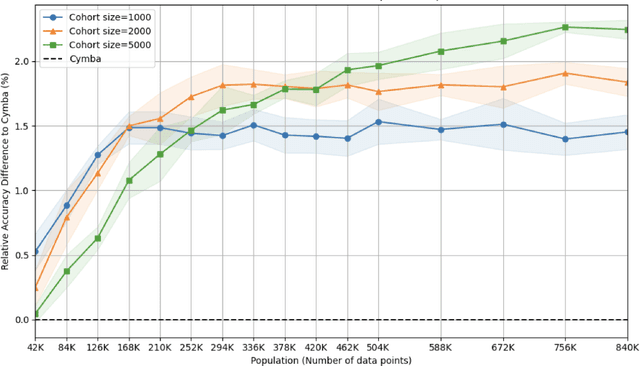
Abstract:This paper presents an implementation of machine learning model training using private federated learning (PFL) on edge devices. We introduce a novel framework that uses PFL to address the challenge of training a model using users' private data. The framework ensures that user data remain on individual devices, with only essential model updates transmitted to a central server for aggregation with privacy guarantees. We detail the architecture of our app selection model, which incorporates a neural network with attention mechanisms and ambiguity handling through uncertainty management. Experiments conducted through off-line simulations and on device training demonstrate the feasibility of our approach in real-world scenarios. Our results show the potential of PFL to improve the accuracy of an app selection model by adapting to changes in user behavior over time, while adhering to privacy standards. The insights gained from this study are important for industries looking to implement PFL, offering a robust strategy for training a predictive model directly on edge devices while ensuring user data privacy.
pfl-research: simulation framework for accelerating research in Private Federated Learning
Apr 09, 2024
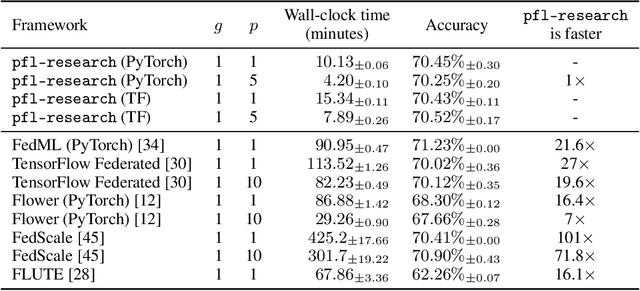

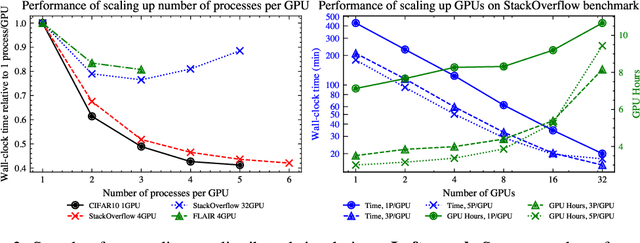
Abstract:Federated learning (FL) is an emerging machine learning (ML) training paradigm where clients own their data and collaborate to train a global model, without revealing any data to the server and other participants. Researchers commonly perform experiments in a simulation environment to quickly iterate on ideas. However, existing open-source tools do not offer the efficiency required to simulate FL on larger and more realistic FL datasets. We introduce pfl-research, a fast, modular, and easy-to-use Python framework for simulating FL. It supports TensorFlow, PyTorch, and non-neural network models, and is tightly integrated with state-of-the-art privacy algorithms. We study the speed of open-source FL frameworks and show that pfl-research is 7-72$\times$ faster than alternative open-source frameworks on common cross-device setups. Such speedup will significantly boost the productivity of the FL research community and enable testing hypotheses on realistic FL datasets that were previously too resource intensive. We release a suite of benchmarks that evaluates an algorithm's overall performance on a diverse set of realistic scenarios. The code is available on GitHub at https://github.com/apple/pfl-research.
Momentum Approximation in Asynchronous Private Federated Learning
Feb 14, 2024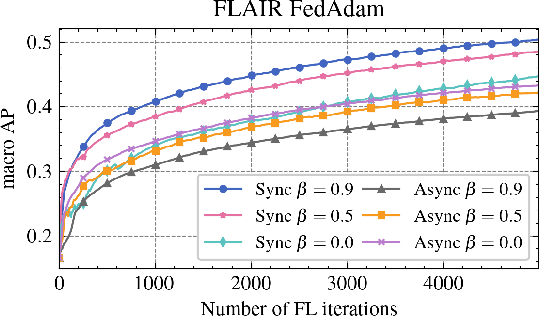
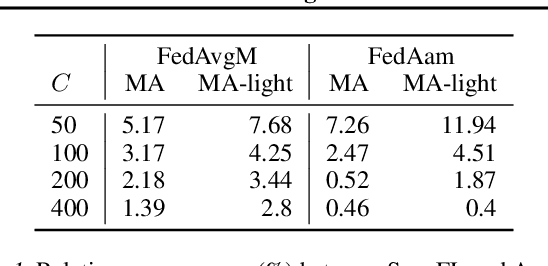

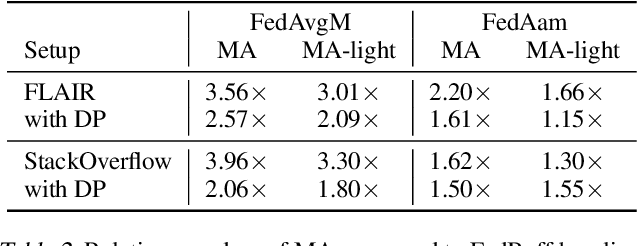
Abstract:Asynchronous protocols have been shown to improve the scalability of federated learning (FL) with a massive number of clients. Meanwhile, momentum-based methods can achieve the best model quality in synchronous FL. However, naively applying momentum in asynchronous FL algorithms leads to slower convergence and degraded model performance. It is still unclear how to effective combinie these two techniques together to achieve a win-win. In this paper, we find that asynchrony introduces implicit bias to momentum updates. In order to address this problem, we propose momentum approximation that minimizes the bias by finding an optimal weighted average of all historical model updates. Momentum approximation is compatible with secure aggregation as well as differential privacy, and can be easily integrated in production FL systems with a minor communication and storage cost. We empirically demonstrate that on benchmark FL datasets, momentum approximation can achieve $1.15 \textrm{--}4\times$ speed up in convergence compared to existing asynchronous FL optimizers with momentum.
Samplable Anonymous Aggregation for Private Federated Data Analysis
Jul 27, 2023Abstract:We revisit the problem of designing scalable protocols for private statistics and private federated learning when each device holds its private data. Our first contribution is to propose a simple primitive that allows for efficient implementation of several commonly used algorithms, and allows for privacy accounting that is close to that in the central setting without requiring the strong trust assumptions it entails. Second, we propose a system architecture that implements this primitive and perform a security analysis of the proposed system.
Population Expansion for Training Language Models with Private Federated Learning
Jul 14, 2023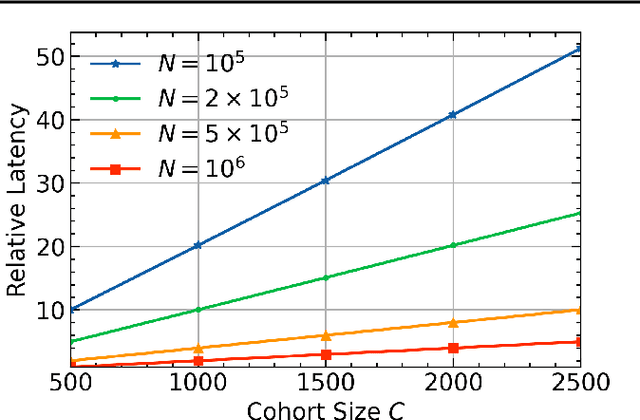
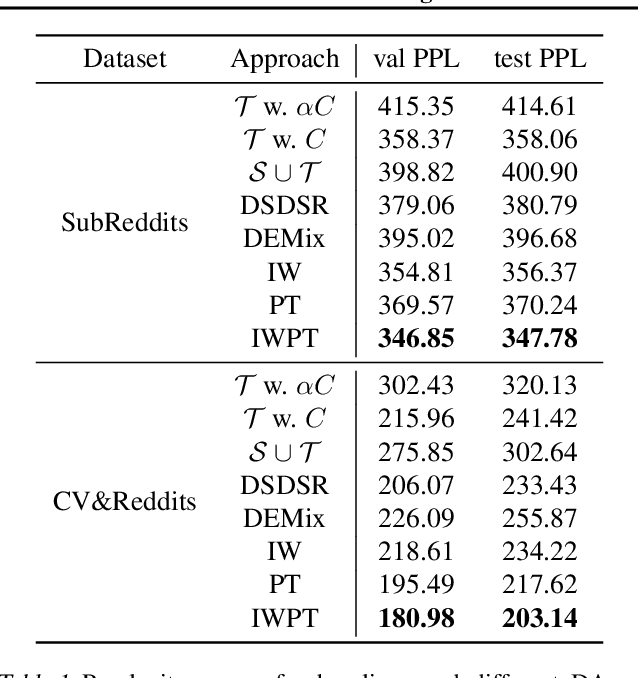
Abstract:Federated learning (FL) combined with differential privacy (DP) offers machine learning (ML) training with distributed devices and with a formal privacy guarantee. With a large population of devices, FL with DP produces a performant model in a timely manner. However, for applications with a smaller population, not only does the model utility degrade as the DP noise is inversely proportional to population, but also the training latency increases since waiting for enough clients to become available from a smaller pool is slower. In this work, we thus propose expanding the population based on domain adaptation techniques to speed up the training and improves the final model quality when training with small populations. We empirically demonstrate that our techniques can improve the utility by 13% to 30% on real-world language modeling datasets.
 Add to Chrome
Add to Chrome Add to Firefox
Add to Firefox Add to Edge
Add to Edge